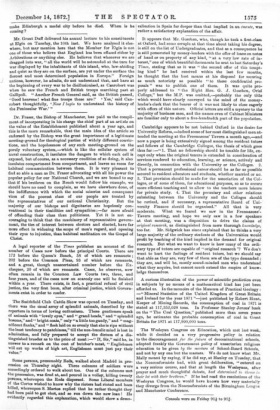Cambridge appears to be not behind Oxford in the desire
for University Reform,—indeed some of her most distinguished men at- tended the meeting at the Freemasons' Tavern a month ago,—and now a paper is being extensively signed among the resident tutors and fellows of the Cambridge Colleges, the thesis of which goes thus far :—" 1. That no fellowship should be tenable for life, ex- cept only when the original tenure is extended in consideration of services rendered to education, learning, or science, actively and directly, in connection with the University or the Colleges. 2. That a permanent professional career should be as far as possible secured to resident educators and students, whether married or no. 3. That provision should be made for the association of the Col- leges, or of some of them, for educational purposes, so as to secure more efficient teaching and to allow to the teachers more leisure for private study. 4. That the pecuniary and other relations subsisting between the University and the Colleges should be revised, and if necessary, a representative Board of Uni- versity Finance should be organised." All that is very moderate. What we feared we saw in the Freemasons'- Tavern meeting, and hope we only saw in a few speakers at that meeting, was a disposition to drive the claims of original research, as distinguished from mere thorough knowledge, too far. Mr. Sidgwick has since explained that he thinks a very large majority of the ordinary students of the Universities would profit by teaching of the kind implied in the demand for original research. But what we want to know is how many of the ordi- nary type of tutors are capable of "original research "? We don't want to hurt the feelings of resident tutors, but we should say that able as they are, very few of them are of the type demanded ; they are, and will be, mostly sound-minded men who understand what they acquire, but cannot much extend the empire of know- ledge themselves.










































 Previous page
Previous page